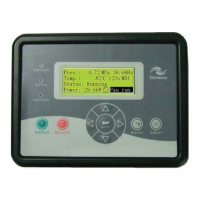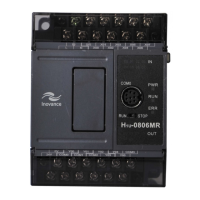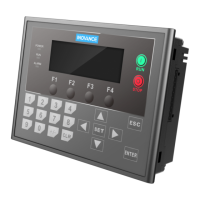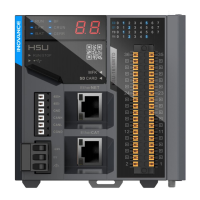170
4
4 Instructions4.5.2 Data Transfer
EMOV: Binary oating point transfer
◆
Overview
The EMOV instruction transfers binary oating-point numbers. Contact driving is required. After the
instruction is executed, the value of the binary oating-point number in S is copied to D.
EMOV S D
Binary floating
point transfer
Applicable model:
H3U
S Data source
Source from which a binary oating-point number is
transferred
32-bit instruction (9
steps)
DEMOV:
Continuous
execution
DEMOVP: Pulse
execution
D
Transfer
destination
Unit that stores the binary oating-point number
transferred to a destination
◆
Operands
Operand
Bit Element Word Element
System·User System·User Bit Designation Indexed Address Constant
Real
Number
S X Y M T C S SM D R T C SD KnX KnY KnM KnS KnSM
V,Z
Modication K H E
D X Y M T C S SM D R T C SD KnX KnY KnM KnS KnSM
V,Z
Modication K H E
Note: The elements in gray background are supported.
◆
Function
The EMOV instruction transfers binary oating-point numbers. Contact driving is required. After the
instruction is executed, the value of the binary oating-point number in S is copied to D.
S is the source from which a binary oating-point number is transferred.
D is the unit that stores the binary oating-point number transferred to a destination.
Example:
Assume that the binary floating-point value in (D1, D0) is 12.345. When
X0 = ON, the binary floating-point value in (D3, D2) changes to 12.345.
When M0 switches from ON to OFF, the value 12.345 in (D3, D2)
remains unchanged, unless the user program modifies the value again.
The value in (D3, D2) is changed when the PLC switches from STOP to
RUN or is powered on again. The value remains unchanged when the
registers with support for retention upon power failure are powered on
or switch from STOP to RUN.
X0
ǒDEMOV D0 D2Ǔ
S D
X1
ǒDEMOVP D10 D12Ǔ
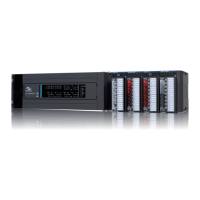
